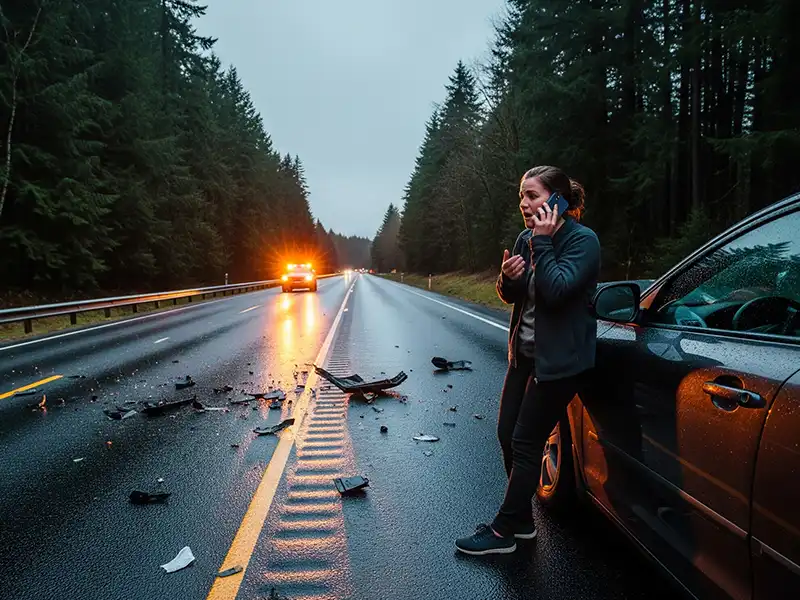What to Do After a Car Accident in Washington
- Home
- /
- Personal Injury
- /
- Motor Vehicle Accidents
- /
- What to Do After...
What to Do After a Car Accident in WA
Table Of Contents

Stay Calm and Check for Injuries
The moments after a car accident are disorienting. Take a breath and check yourself and your passengers for injuries. If anyone is seriously hurt, call 911 immediately. Don’t try to move injured individuals unless there’s immediate danger (like fire or fuel leak).
Call 911 and Report the Crash
Under RCW 46.52.030, Washington drivers must report collisions that result in injury, death, or significant property damage.
- Call 911 to alert police and emergency responders
- Request a police report. This will be valuable for your claim
- Cooperate with law enforcement, but don’t admit fault
If the accident is minor and doesn’t meet reporting thresholds, you can file a collision report online through the Washington State Patrol.
Move to Safety, If You Can
If the vehicles are drivable and no one is seriously injured, move to the side of the road. Turn on hazard lights and set out flares or cones if available. This helps prevent additional crashes, especially in high-traffic or low-visibility areas.
Exchange Information
You’re legally required to exchange certain information with the other driver, including:
- Name, address, and phone number
- Driver’s license number
- Vehicle registration
- Insurance carrier and policy number
Do not discuss who caused the crash or make statements like “I’m sorry,” as even small comments can be used against you later.
Document the Scene
- Take photos of all vehicles, damage, skid marks, and road conditions
- Photograph driver’s licenses and insurance cards
- Note time of day, weather, and traffic signs
- Get names and contact info from witnesses
This documentation will support your insurance claim and any future legal action.
Seek Medical Attention
Even if you feel fine, it’s a good idea to get checked by a doctor after a crash. Many injuries, like concussions or soft tissue damage, aren’t obvious right away.
Document your symptoms and treatment. This creates a medical record that helps support your claim later.
Notify Your Insurance Company
Most insurance policies require prompt notice of a crash. When reporting:
- Stick to the facts. Don’t speculate or assign blame
- Do not give a recorded statement without legal advice
- Mention if the other driver fled (hit-and-run) or appeared impaired (DUI)
If you carry Personal Injury Protection (PIP) or Uninsured/Underinsured Motorist (UM/UIM) coverage, this may help cover expenses even if the other driver is at fault.
Know Your Rights Under Washington Law
Washington is a fault-based state, which means the driver who caused the accident is financially responsible for the damages.
You may be entitled to compensation for:
- Medical bills
- Lost income
- Pain and suffering
- Car repairs or replacement
- Long-term disability
Even if you’re partially at fault, Washington’s comparative fault law may still allow you to recover damages, reduced by your percentage of fault. Visit our Comparative Fault in WA and Uninsured Motorist Lawyer Olympia pages to learn more.
Talk to a Car Accident Lawyer if You’re Injured
Insurance companies aren’t looking out for your best interests. Before you accept a settlement or make any official statement, talk to a lawyer.
At Morgan Hill PC, we’ve helped countless car accident victims in Olympia and across Washington understand their rights and get the compensation they deserve.
Your consultation is free, and you don’t pay unless we win.
FAQ: Post-Accident Help in Washington
Q: Do I have to report every accident in Washington?
A: No. Only report collisions that cause injury, death, or at least $1,000 in damage. But calling 911 is always safest.
Q: Should I talk to the other driver’s insurance company?
A: Not without legal advice. They may try to get you to say something that reduces or denies your claim.
Q: What if the other driver left the scene?
A: That’s a hit-and-run. Report it immediately and call us. Your UM coverage may still apply.
Q: How long do I have to file a claim?
A: In Washington, the statute of limitations is generally 3 years from the date of the accident. But don’t wait. Early action preserves evidence and improves your chances.